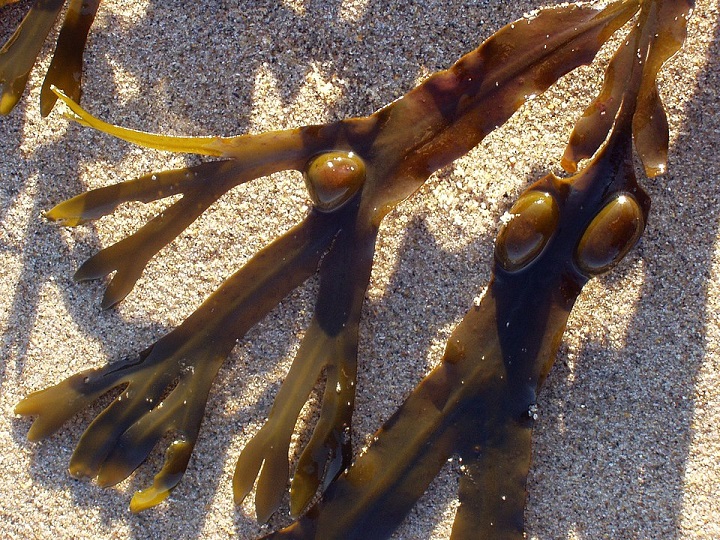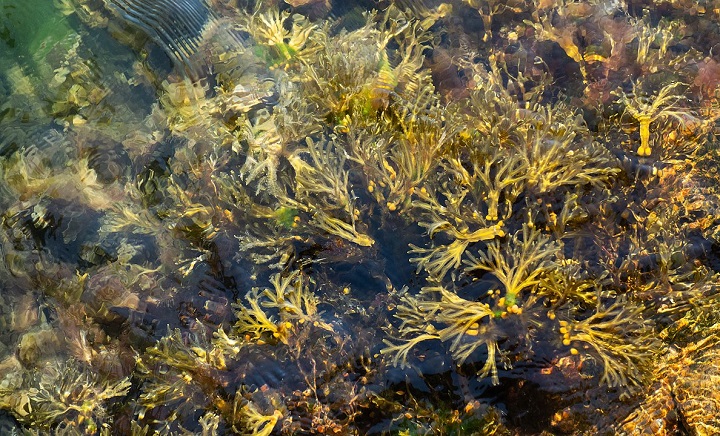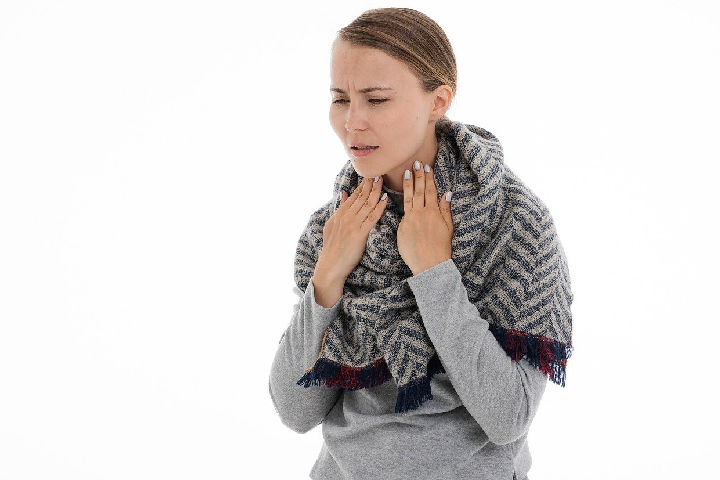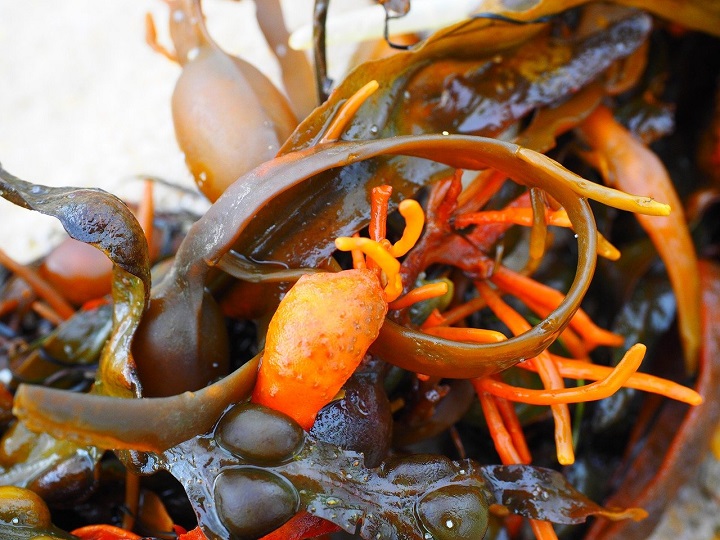Bladderwrack (Fucus vesiculosus) is a kind of brown seaweed that’s tied to traditional medicine. It’s called rockweed, red fucus, dyers fucus, rock wrack, black tang, and bladder fucus. Growing up to 35 inches (90 cm) tall, It develops along the coastlines of the Atlantic and Pacific Oceans, the North and Baltic Seas, and different waters in Canada and the United States.
Rich in vitamins, minerals, and antioxidants, numerous individuals believe that bladderwrack’s impressive nutrient profile can give health benefits, though critics argue the claims are ahead of the research.
Table of Contents
1. What Is Bladderwrack Used for?
It is one of the highest iodine-containing sea vegetables known. The iodine in bladderwrack is available in the form of di-iodotyrosine (DIT), which is an ordinary precursor of the Thyroid Hormones T4 (Thyroxine) and T3 (tri-iodothyronine). T4 is manufactured by the condensing of DIT and thyroid peroxidase enzyme in the thyroid gland’s follicular lumina.
Iodine’s naturally happening source makes Bladderwrack an excellent choice in supporting a healthy functioning thyroid gland when more iodine is required for ideal function. It is additionally perceived as a source of other naturally happening minerals such as iron, zinc, magnesium, and potassium.
2. How to Use It
For short-term use (a couple of days) to relieve constipation, powdered bladderwrack can be taken in the measure of 1 teaspoon three times per day alongside at least 8 oz of water each time. For thyroid issues, gastritis, or heartburn, 5 to 10 grams of dried bladderwrack in capsules three times each day has been recommended.

Source: Wikipedia
Alternately, bladderwrack might be eaten entire or made into a tea utilizing 1 teaspoon per cup of heated water, permitting each cup to sit at least 10 minutes before drinking. Three cups for each day of tea can be drunk. No additional than 150 mcg iodine should be consumed from all sources, as well as bladderwrack, per day.
However, most bladderwrack products do not allow any sign of their iodine content. Therefore, anyone considering taking bladderwrack should initially consult a physician trained in nutrition and herbal medicine.
3. This Supplement Has Been Used in Connection With the Following Health Conditions
a. Constipation
Alginic acid, one of the significant constituents in bladderwrack, is a dietary fiber that might be utilized to relieve constipation.
b. Diarrhoea
Alginic acid, a basic in bladderwrack, is a dietary fiber and may help relieve diarrhea.
c. Gastritis
It is high in mucilage, which may be favorable for gastritis individuals since its slippery nature soothes irritated mucus membranes of the digestive tract.
d. Gastroesophageal Reflux Disease
It is a soothing herb customarily used to treat reflux and heartburn.
e. Hypothyroidism
It is a sort of brown seaweed that contains iodine. Hypothyroidism because of lacking iodine intake may improve with bladderwrack supplementation.
f. Indigestion, Heartburn, and Low Stomach Acidity
It is a demulcent herb, meaning it appears to work by diminishing inflammation and forming a barrier against irritants, for example, stomach acid.
g. Wound Healing
Alginic acid is one of the principal constituents in bladderwrack. Calcium alginate has indicated promise as an agent to speed wound healing.
4. Bladderwrack Nutrition
For centuries, numerous cultures have consumed seaweed as part of their standard diet due to its impressive nutrient profile.
It is a kind of seaweed that’s plentiful in vitamins and minerals, such as calcium, iodine, magnesium, potassium, sodium, zinc, and vitamins A and C.

Source: Wikipedia
It’s additionally high in phytochemicals. These health-promoting plant compounds, which incorporate phlorotannins and fucoxanthin, may help lower oxidative stress — an imbalance between free radical and antioxidant levels in your body.
It is high in fiber, which can support a healthy gut. Specifically, it’s high in alginic acid and fucoidans, which have both been appeared to have health-promoting properties.
5. Is Bladderwrack Effective for Weight Loss?
Eventually, the key to weight reduction is to burn more calories than you take in. You need to decrease your complete calories by 3,500 to lose 1 lb., and a protected measure of weight to fail is 1 to 2 lbs. a week. This is best accomplished through a combination of diet and exercise.
Nonetheless, individuals take supplements in the hopes of boosting their weight reduction. It is one exotic herbal supplement, although research does not support its supposed weight-loss impacts.
Thyroid and Weight
The thyroid gland encourages control of your metabolism to keep a healthy weight. If you do not produce enough thyroid hormone, as is the case with hypothyroidism, your body eases back down, and your appetite can change, resulting in weight gain.
Iodine, which is found in bladderwrack, might help this condition, but it relies on the reason for your hypothyroidism. Talk to your doctor before taking it for this, as it can cause hypothyroidism too.
6. Bladderwrack Side Effects
Female who are pregnant or breastfeeding must not takings this herbal supplement. The side effects of bladderwrack happen if there has been excess ingestion of iodine or utilized for a prolonged period. It is wise to check with your medical professional before adding this herbal cure to your health regimen. Lavish iodine in the body can root the subsequent side effects:
Thyroid problems: excessive concentrations of iodine can worsen thyroid issues. If you experience hyperthyroidism, then you may not need an additional boost of iodine.

Iodine allergy: A few people are allergic to iodine, so large amounts of bladderwrack could be hazardous.
Heavy metal contamination: Seaweeds that grow within waters with high levels of heavy metals, particularly arsenic and lead, are harmful to health. They can lead to nerve or kidney harm and other issues.
Acne breakout: Kelp or seaweed ingestion might cause acne breakouts in specific individuals.
Ultimately, if you have an upcoming surgery or experience a bleeding disorder, you should avoid bladderwrack, as it can make blood clotting more troublesome.

